The lack of type-level sharing in Haskell is a long-standing problem. It means, for example, that this simple Haskell code
apBaseline :: Applicative f => (A -> B -> C -> r) -> f r
apBaseline f =
pure f
<*> pure A
<*> pure B
<*> pure Cresults in core code that is quadratic in size, due to type arguments; in pseudo-Haskell, it will look something like
apBaseline :: Applicative f => (A -> B -> C -> r) -> f r
apBaseline f =
(pure f)
<*> @A @(B -> C -> r) (pure A)
<*> @B @( C -> r) (pure B)
<*> @C @( r) (pure C)Each application of (<*>) records both the type of the argument that we are
applying, as well as the types of all remaining arguments. Since the latter is
linear in the number of arguments, and we have a linear number of applications
of <*>, the core size of this function becomes quadratic in the number of arguments.
We recently discovered a way to solve this problem, in ghc as it is today
(tested with 8.8, 8.10, 9.0 and 9.2). In this blog post we will describe the
approach, as well as introduce a new typechecker plugin (available from
Hackage or GitHub) which makes the process
more convenient.
It is exciting that we now have an answer to a previously unsolved problem, but it must be admitted that the resulting code is not very elegant, and fairly unpleasant to write. It will be necessary to explore this new approach, find new ways to use it and adapt it to improve the user experience. We are nonetheless releasing this blog post, and the plugin, in the hope that others might feel inspired to experiment with it and devise new ways in which it can be used.
Vanilla ghc
Before we introduce the new typechecker plugin, we will first demonstrate the
concept in vanilla ghc. Here’s the main idea: we will represent a type-level
let-binding as an existentially quantified type variable, along with an
equality that specifies the value of that variable; the equality will be opaque
to ghc until we reveal it.
That probably sounds rather abstract, so let’s make this more concrete:
data a :~: b where -- defined in base (Data.Type.Equality)
Refl :: a :~: a
data LetT :: a -> Type where -- new
LetT :: (b :~: a) -> LetT aThe LetT constructor has two type variables, a and b; b is the
existential type variable mentioned above, while a is a regular type variable,
and will correspond to the value of the type variable we are “let-binding”. In
other words, think of this as a type-level assignment b := a. The argument b :~: a records the equality between a and b; it is opaque to ghc in the
sense that ghc will not be aware of this equality until we pattern match on
the Refl constructor.
When we construct a let-binding, a and b will (by definition) have the same
value, and so we can introduce a helper function:
{-# NOINLINE letT #-}
letT :: LetT a
letT = LetT ReflThis gives us a let-binding with value a, for an existential variable that we
will discover when we pattern match on the LetT constructor.1
This is all probably still quite abstract, so let’s see a simple example of how we might use this:
castSingleLet :: Int -> Int
castSingleLet x =
case letT of { LetT (p :: b :~: Int) -> -- (1)
let x' :: b
x' = case p of Refl -> x -- (2)
in case p of Refl -> x' -- (3)
}In (1), we introduce a type-level let-binding b := Int. Then in (2) we
define a value x' of type b; we know that b := Int, but ghc doesn’t,
and so we explicitly pattern match on the equality proof. Finally, in (3) we
want to use x' as the result of the function; for this we need to cast back
from b to Int.
Of course, this example is a bit pointless, so let’s consider how we might actually use this to solve a problem.
Heterogenous lists
We will come back to the applicative example from the introduction a bit later, but let’s consider a slightly simpler example first. Recall this definition of heterogenous lists:
data HList :: [Type] -> Type where
HNil :: HList '[]
HCons :: x -> HList xs -> HList (x : xs)Without type-level sharing, we cannot construct values of type HList without
resulting in quadratic core code size, for much the same reason as before.
For example,
hlistBaseline :: HList '[A, B, C]
hlistBaseline =
HCons A
$ HCons B
$ HCons C
$ HNilwill be expanded with type variables to something like
hlistBaseline :: HList '[A, B, C]
hlistBaseline =
HCons @'[A, B, C] A
$ HCons @'[ B, C] B
$ HCons @'[ C]
$ HNilwhere we again have a linear number of calls to HCons, each of which has a
list of type arguments which is itself linear; hence, this value is quadratic
in size.
Let’s fix that. Instead of repeating the list each time, we will introduce type-level sharing so that we can express, “this list is like that other list over there, but with an additional value at the front”. Let’s first define the various type-level lists:
hlist1 :: HList '[A, B, C]
hlist1 =
case letT of { LetT (p2 :: r2 :~: (C : '[])) -> -- r2 := C : []
case letT of { LetT (p1 :: r1 :~: (B : r2 )) -> -- r1 := B : r2
case letT of { LetT (p0 :: r0 :~: (A : r1 )) -> -- r0 := A : r1
...
}}}With the type-level lists defined, we can now define the corresponding values.
Just like before, we need to cast explicitly. For example, the list HCons C HNil
has type HList (C : '[]); we know that this is the same as HList r2, but
to convince ghc of that fact, we need to appeal to the explicit equality.
let xs2 :: HList r2
xs1 :: HList r1
xs0 :: HList r0
xs2 = case p2 of Refl -> HCons C HNil
xs1 = case p1 of Refl -> HCons B xs2
xs0 = case p0 of Refl -> HCons A xs1Finally, we need to cast back from HList r0 to HList '[A, B, C]; we will
need to appeal to all equalities in order to do so. The full function is:
hlist1 :: HList '[A, B, C]
hlist1 =
case letT of { LetT (p2 :: r2 :~: (C : '[])) ->
case letT of { LetT (p1 :: r1 :~: (B : r2 )) ->
case letT of { LetT (p0 :: r0 :~: (A : r1 )) ->
let xs2 :: HList r2
xs1 :: HList r1
xs0 :: HList r0
xs2 = case p2 of Refl -> HCons C HNil
xs1 = case p1 of Refl -> HCons B xs2
xs0 = case p0 of Refl -> HCons A xs1
in case p0 of { Refl ->
case p1 of { Refl ->
case p2 of { Refl ->
xs0
}}}
}}}Unpacking equalities
It is critical that ghc cannot see the equalities we introduce, because if it
did, it would just unfold the definition and we’d lose the sharing we worked so
hard to introduce. Nonetheless, the need to match on all these equality proofs
in order to cast values to the right type is certainly inconvenient. It is also
easy to get wrong; we will discuss that problems in this section, but
fortunately we can avoid the need for pattern matching altogether when we use
the typelet type checker plugin; we will introduce this plugin in the next
section.
The reason that the pattern matches are easy to get wrong is that we need to match in the right order. Concretely, if instead of the order above, we instead did
case p2 of { Refl ->
case p1 of { Refl ->
case p0 of { Refl ->
xs0
}}}we would end up with quadratic code again.
This is due to the shape of the equality proof that ghc constructs: xs0 has
type HList r0, but we want to use it at type HList '[A, B, C]. There are
sufficient equalities in scope to enable ghc to prove that these two types
are in fact the same, which is why the program is accepted, but the resulting
core code will look like
xs0 `cast` {- .. proof that HList r0 ~ HList '[A, B, C] .. -}In the linear version (where we pattern match on p0 first), we end up with
the proof
let co2 :: r2 ~ (C : [])
co1 :: r1 ~ (B : r2)
co0 :: r0 ~ (A : r1)
co2 = ..
co1 = ..
co0 = ..
in .. co2 .. co1 .. co0 ..which mirrors our own definitions very closely. However, if we match in the wrong order, we get this proof instead:
let co2 :: r2 ~ '[ C]
co1 :: r1 ~ '[ B, C]
co0 :: r0 ~ '[A, B, C]
co2 = ..
co1 = .. co2 ..
co0 = .. co1 ..
in .. co0 ..When we unpack the equalities in the right order, ghc first learns that r0 ~ (A : r1), without yet knowing what r1 is, and so it just constructs a proof
for that; similarly, on the next equality, it learns that r1 ~ (B : r2),
without knowing what r2 is, and so it constructs the corresponding proof
(without modifying the proof it generated previously). When we do things in the
opposite order, ghc first learns that r2 ~ (C : '[]); then when it learns
that r1 ~ (B : r2), it already knows what r2 is, and so it constructs a
proof for r1 ~ (B : C), and we have lost sharing.
Of course, we don’t really want these proofs at all, and indeed, when we use the plugin, we won’t get them.
The typelet typechecker plugin
To use the typelet typechecker plugin, just add
{-# OPTIONS_GHC -fplugin=TypeLet #-}at the top of your module. When we use type plugin, we can write the HList
example as
hlistLet :: HList '[A, B, C]
hlistLet =
case letT (Proxy @(C : '[])) of { LetT (_ :: Proxy r2) ->
case letT (Proxy @(B : r2)) of { LetT (_ :: Proxy r1) ->
case letT (Proxy @(A : r1)) of { LetT (_ :: Proxy r0) ->
let xs2 :: HList r2
xs1 :: HList r1
xs0 :: HList r0
xs2 = castEqual (HCons C HNil)
xs1 = castEqual (HCons B xs2)
xs0 = castEqual (HCons A xs1)
in castEqual xs0
}}}We still need to be explicit about when we want to cast, but we don’t need to be explicit anymore about how we want to cast. As an additional bonus, the resulting core code also doesn’t have any coercion proofs. (We will see below how we can rewrite this example more compactly using another combinator from the library.)
In the remainder of this blog post we will discuss the type system extension provided by the plugin. We will not discuss how it works internally; it is a reasonably simple type checker plugin and a discussion of the implementation is not relevant for our goal here, which is type-level sharing.
Let and Equal
The typelet library introduces two new classes, Let and Equal. Let
is defined as
class Let (a :: k) (b :: k)A constraint Let x t, where x is an existentially bound type variable,
models a type-level let-bnding x := t. Only constraints of this shape (with
x a variable2) are valid, and let-bindings cannot be recursive; if
either of these conditions are not met, the plugin will emit a type error.
Let has a single instance for reflexivity (much like the use of Refl in
letT above):
instance Let a aIn order to introduce the existential type variable, we define a LetT type
much like we did above, but now carrying evidence of a Let constraint:
data LetT (a :: k) where
LetT :: Let b a => Proxy b -> LetT a
letT :: Proxy a -> LetT a
letT p = LetT pOf course, introducing let bindings is only one half of the story. We must
also be able to apply them. This is where the second class, Equal, comes
in:
class Equal (a :: k) (b :: k)
castEqual :: Equal a b => a -> b
castEqual = unsafeCoerceEqual is a class without any instances; constraints Equal a b are instead
solved by the plugin. Function castEqual allows to coerce from a to b
whenever the plugin can prove that a and b are equal3.
Formally:
In order words, the Let constraints define an (idempotent) substitution, and
an Equal a b constraint is solvable whenever a and b are nominally equal
types after applying that substitution.
For a trivial example, two types that are already nominally equal will also
be Equal:
castReflexive :: Int -> Int
castReflexive = castEqualThe following example is slightly more interesting, and is the equivalent of
castSingleLet that we already saw above, but now using the plugin:
castSingleLet :: Int -> Int
castSingleLet x =
case letT (Proxy @Int) of
LetT (_ :: Proxy t1) ->
let y :: t1
y = castEqual x
in castEqual yWe saw a more realistic example above, in the definition of hlistLet.
Combining a type-level let with a cast
In castSingleLet we define a type variable t1, and then immediately
cast a value to that type. That is such a common idiom that the typelet
library provides a custom combinator for it:
data LetAs f (a :: k) where
LetAs :: Let b a => f b -> LetAs f a
letAs :: f a -> LetAs f a
letAs x = LetAs xMost of the time, we don’t want to hide the entire type of some value, because
then that value would become unuseable without a cast (we’d have no information
about its type). That’s why LetAs is parameterised by some functor f; when
we have a value of type f a, letAs introduces a let-binding b := a, and
then casts the value to f b. Here is a simple example:
castSingleLetAs :: Identity Int -> Identity Int
castSingleLetAs x =
case letAs x of
LetAs (x' :: Identity t1) ->
castEqual x'For a more realistic example, let’s consider the HList example once more. Here
too we see the same idiom: we introduce a type-level let binding for the
type-level list, and then cast a term-level value. Using letAs we can do that
in one go:
hlistLetAs :: HList '[A, B, C]
hlistLetAs =
case letAs (HCons C HNil) of { LetAs (xs02 :: HList t02) ->
case letAs (HCons B xs02) of { LetAs (xs01 :: HList t01) ->
case letAs (HCons A xs01) of { LetAs (xs00 :: HList t00) ->
castEqual xs00
}}}CPS
Both letT and letAs introduce a data constructor, only for us to then
directly pattern match on it again. The obvious question then is whether we
might be able to avoid this using CPS form. Indeed we can, but we do have to be
careful. The library defines CPS forms of both letT and letAs:
letT' :: forall r a. Proxy a -> (forall b. Let b a => Proxy b -> r) -> r
letT' pa k = case letT pa of LetT pb -> k pb
letAs' :: forall r f a. f a -> (forall b. Let b a => f b -> r) -> r
letAs' fa k = case letAs fa of LetAs fb -> k fbThe problem is that these abstractions introduce a type variable for the
continuation (r), which may itself require sharing. The “obvious but wrong”
translation of hlistLetAs, above, is
hlistLetAsCPS_bad :: HList '[A, B, C]
hlistLetAsCPS_bad =
letAs' (HCons C HNil) $ \(xs02 :: HList t02) ->
letAs' (HCons B xs02) $ \(xs01 :: HList t01) ->
letAs' (HCons A xs01) $ \(xs00 :: HList t00) ->
castEqual xs00This is wrong, because the continuation variable r for each call to letAs'
is HList '[A, B, C]: the type of the final result. But this means that we
have n occurrences of the full n elements of the list, and so we are back
to code that is O(n²) in size. If we do want to use CPS form, we have to
introduce one additional let binding for the final result:
hlistLetAsCPS :: HList '[A, B, C]
hlistLetAsCPS =
letT' (Proxy @'[A, B, C]) $ \(_ :: Proxy r) -> castEqual $
letAs' @(HList r) (HCons C HNil) $ \(xs02 :: HList t02) ->
letAs' @(HList r) (HCons B xs02) $ \(xs01 :: HList t01) ->
letAs' @(HList r) (HCons A xs01) $ \(xs00 :: HList t00) ->
castEqual xs00Applicative
For the HList example, we can give a type-level let for the tail of the list
(C ': []), and at the same type provide a value of that type. The fact that we
do things “in the same order” at the type level is what made it possible to use
the letAs combinator.
Unfortunately, that is not always the case. For example, in the applicative chain example from the introduction the order doesn’t quite work out: we must give type-level let bindings starting at the end
l02 := C -> r
l01 := B -> l01
l00 := A -> l00but we need to apply arguments in the reverse order (A, then B, then C).
Put another way, associativity at the type-level and at the term-level match for the
HList example (both right-associative), but mismatch for the applicative
example (right associative for the function type and left associative for
function application).
Perhaps we will discover further combinators that help with this example, but for now it means that we need to use the more verbose option to write the function:
apLet :: forall f r. Applicative f => (A -> B -> C -> r) -> f r
apLet f =
case letT (Proxy @(C -> r)) of { LetT (_ :: Proxy l02) ->
case letT (Proxy @(B -> l02)) of { LetT (_ :: Proxy l01) ->
case letT (Proxy @(A -> l01)) of { LetT (_ :: Proxy l00) ->
let f00 :: f l00
f01 :: f l01
f02 :: f l02
res :: f r
f00 = pure (castEqual f)
f01 = castEqual f00 <*> pure A
f02 = castEqual f01 <*> pure B
res = castEqual f02 <*> pure C
in res
}}}Benchmarks
Is all this really worth it? It depends. For the applicative chain, the difference is not huge, and the let-bindings add some overhead:
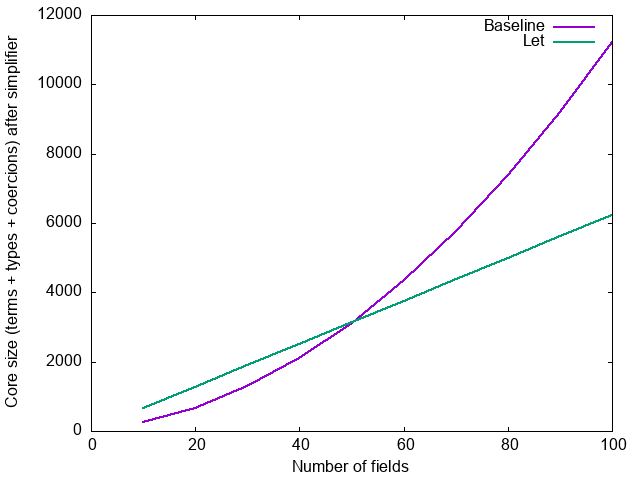
For GADTs, however, the difference is much more dramatic. For the HList
example, after desugaring:
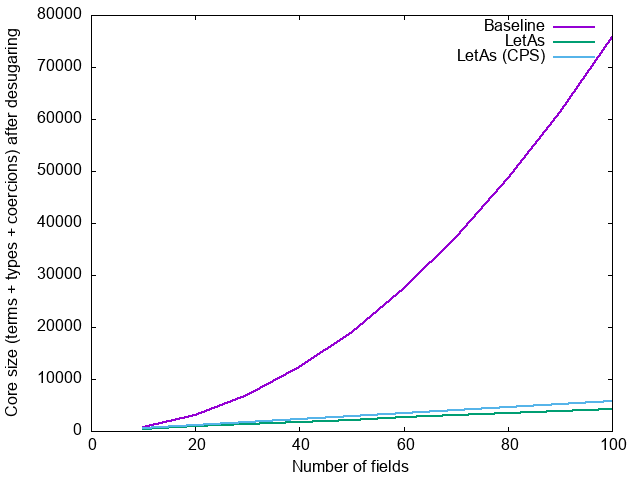
and after the simplifier:
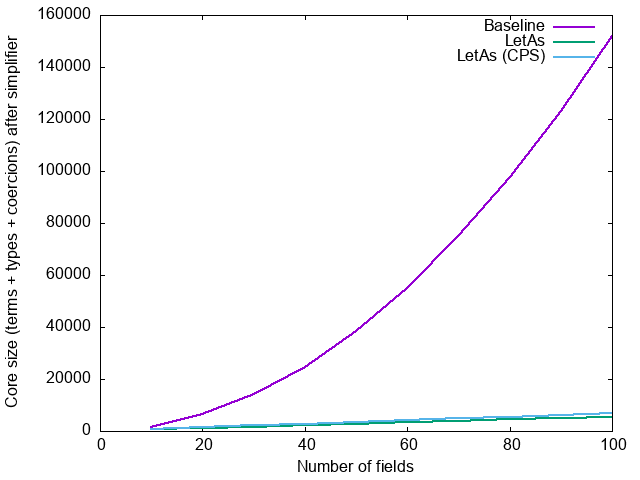
This is all with -O0; the primary goal here is to optimize compilation time
during development. Talking of compilation time, let’s measure that too.
Unfortunately, the performance of the HList example using letAs (rather than
the CPS version) depends critically on the performance of ghc’s pattern match
exhaustiveness checker, which differs quite a bit between ghc versions. Let’s
first disable that altogether:
-Wno-incomplete-patterns -Wno-incomplete-uni-patterns -Wno-overlapping-patternsWith these options, compilation time for the three HList variations (baseline
without sharing, letAs, and the CPS version letAs') are similar across
ghc 8.8, 8.10, 9.0 and 9.2, and look something like (compilation time in ms
versus number of entries in the list):
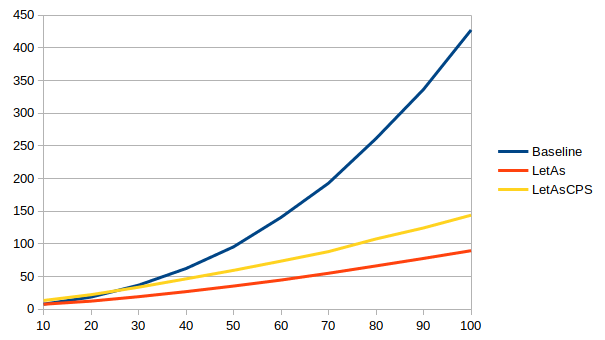
With the exhaustiveness checker enabled, times vary wildly between ghc
versions for the non-CPS version (note: these graphs have different ranges
on their y-axes):
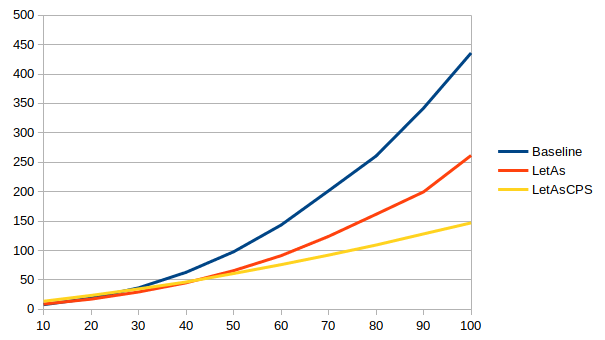
|
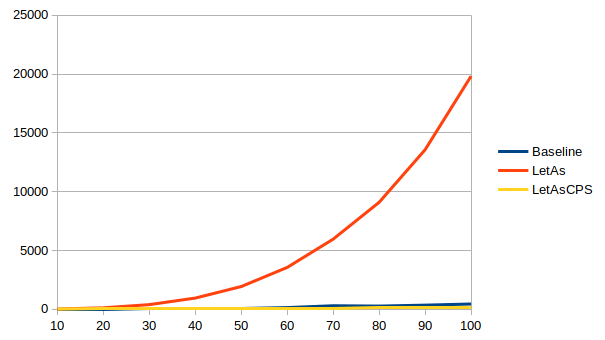
|
| 8.8 | 8.10 |
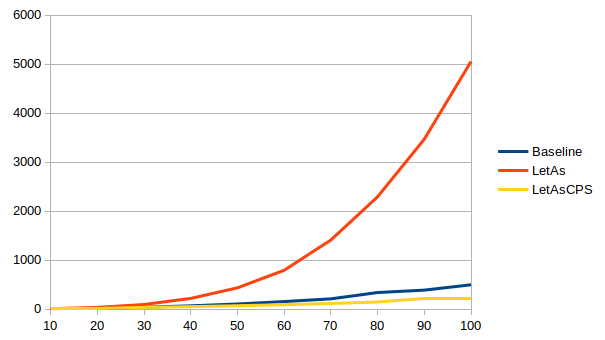
|
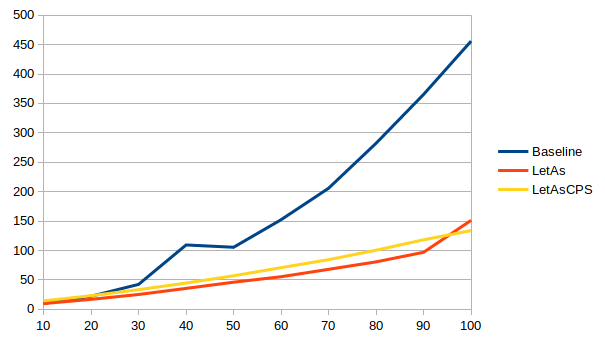
|
| 9.0 | 9.2 |
The non-CPS version is up to 1.6x faster than the baseline in 8.8, but up to 44x slower in 8.10. The situation improves a bit in 9.0, but it’s still up to 10x slower than the baseline, until sanity is restored in 9.2 and the non-CPS version is up to 3x faster than the baseline.
The CPS version meanwhile is more stable across versions: up to 3x faster in 8.8 and 8.10, a slightly less impressive improvement of up to 2.4x faster in 9.0, and then back to up to 3.4x faster in 9.2.
Conclusions
The typelet type checker plugin offers an API that makes it possible to
introduce type-level sharing in ghc as it is today (tested with 8.8, 8.10, 9.0
and 9.2). This is pretty exciting, but like any new abstraction, we need to
experiment with it to discover the best way it can be used. We are releasing the
plugin as well as this blog post at this early stage in the hope that others
will feel inspired to try it and share their discoveries.
Our own motivation for developing this now is our continued efforts on behalf of Juspay to improve their compile times. In particular, we are currently looking at how we could support large anonymous records that compile in less-than-quadratic core space. Of course, type level sharing is only one weapon in our arsenal if we want to optimize for compilation time; my previous two blog posts in this series (Avoiding quadratic core code size with large records and Induction without core-size blow-up) discuss many others, and the search is not yet over.
For this version (without the plugin), it is crucial that
letTis marked asNOINLINE, because if it isn’t, even with-O0the optimizer will inline it, evaluate thecaseexpressions, and we lose all sharing again.↩︎In fact,
xmust be a skolem variable: one that cannot unify with anything.↩︎It is possible that the lack of a explicit dependency of
castEqualon the evidence forEqual(and then, transitively, the lack of an explicit dependency of the evidence forEqualon theLetconstraints that justify it), may under certain circumstances result inghc’s optimizer floating theunsafeCoercetoo far up. It is not clear to me at present whether this can actually happen. Although theEqualevidence is trivial, it does at least record the full types of the left-hand side and right-hand side of the equality; we have also markedcastEqualin an attempt to make sure that theunsafeCoercedoes not escape the scope of theEqualevidence. Nonetheless, it is conceivable that we might have to revisit this.↩︎
